Previous Charges of Bias
Last year, we released an in-depth report analyzing one year of the BBC’s coverage of the Israeli-Palestinian conflict. We found that the BBC has a consistent record of portraying Israeli actions in a negative light while increasing sympathy for the Palestinian point of view. Rather than respond to the criticisms in our report, the BBC chose to accuse us of bias:
HonestReporting has a particular view of the conflict and cannot be seen as an independent arbiter of our output.
That previous analysis examined the BBC’s reporting, based not on subjective opinion, but on the very journalistic standards that the BBC claims to uphold. We presented hard facts but our work was summarily rejected by the BBC, which has failed to provide its own analysis as to why HonestReporting should be considered an unsuitable judge.
HonestReporting is not alone in accusing the BBC of systemic bias against Israel. Several years ago, the BBC conducted its own investigation into whether the network held an anti-Israel bias. The result — a report by senior news editor Malcolm Balen — was a lengthy study that the corporation refuses to make public. In an ongoing legal battle to force the BBC to make the report public, the British House of Lords recently ruled against the BBC and sent the case back to the High Court. We hope the High Court will force the BBC to release its study into the public domain.
In light of this ongoing legal effort, we decided to examine the BBC’s coverage of the recent conflict in the Gaza Strip. Images and accounts of the conflict have had a significant impact on public opinion, with many viewing Israel’s actions as, at best, “disproportionate” and, at worst, “war crimes”. The BBC is one of the most influential media organizations in the world. We wanted to see if its coverage encouraged such notions. What we found was an overwhelming tendency to highlight cases of both real and unproven Palestinian suffering while making Israeli actions appear trivial or illegitimate.
Comparison With Conflict in Sri Lanka
It is extremely appropriate to highlight the BBC’s coverage of the Middle East considering the importance that the BBC attaches to the region. During the conflict, the BBC published, on average, 4.5 articles every day dealing with the fighting. In contrast, BBC coverage of the Sri Lankan government’s campaign against the Tamil Tigers group — a conflict that resulted in an estimated 2,000 civilian deaths in January of 2009 — produced barely one article a day.
According to human rights organizations, the conflict in Sri Lanka includes intentional attacks by both sides on civilians, attacks on hospitals (twenty attacks from December through February alone), and the use of human shields. Yet the BBC gives this conflict, estimated to have resulted in hundreds of thousands of civilian deaths, less than one quarter the average daily coverage of the Gaza conflict. If the BBC is going to focus this much on Gaza, it must expect scrutiny of that coverage.
Summary
We analyzed articles appearing on the BBC website beginning on December 22, 2008, when Hamas announced that it was ending the ceasefire, until January 19, 2009 when both sides announced a new temporary ceasefire. Over these 28 days, the BBC published 126 articles — an average of over four each day. We found that the vast majority of these articles contained unproven accusations against Israel, graphic and out-of-context images, and highlighted quotations that reflected negatively on Israel and the Israeli Defense Forces.
Unsubstantiated Eyewitness Accounts
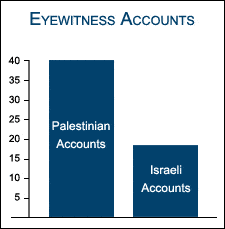
BBC coverage of the war included 58 accounts from “eyewitnesses” about what was happening and how the war was affecting their lives. Forty of these accounts were from Palestinians while only 18 were from Israeli civilians living under a constant barrage of rocket and mortar attacks.
Often, these accounts were unsubstantiated charges. For example, on January 14, the BBC published a lengthy article containing allegations such as:
One testimony heard by the BBC and human rights group B’tselem describes Israeli forces shooting a woman in the head after she stepped out of her house carrying a piece of white cloth, in response to an Israeli loudhailer announcement.
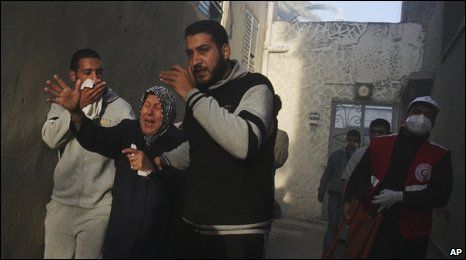
The image on the right accompanying the story carried an implication that there was photographic proof of the woman’s story. In fact, that image was unrelated to the testimony heard by the BBC. The article contained several other graphic images as well as similar allegations of Israeli soldiers acting inhumanely and intentionally targeting civilians — all without any evidence besides the testimony of Palestinians.
“Not Possible to Verify Accounts”
The same article says that “Israel is denying access to Gaza for international journalists and human rights monitors, so it is not possible to verify the accounts.” However, rather than lending legitimacy to the article, such a statement is an admission that the whole article — with images and shocking headlines and quotations — may very well be a complete fabrication. One of the basic rules of journalism is the responsibility to corroborate testimony. In this regard, the BBC has failed miserably.
Jeremy Bowen, the BBC’s Middle East editor, kept a running diary of the conflict. In one entry, poignantly titled “Tears of a Mother,” Bowen publicizes another shocking claim:
Zeinat said the Israeli troops had herded several families from the al-Samouni clan into one of the houses.
She said soldiers came in and asked for the house owner. Her husband, Atiya, put up his hand.
A soldier shot him through the head at point blank range.
Then the soldiers sprayed the room with gunfire, she says. Her four-year-son was killed.
Yet where were the follow-up investigations to these claims? What evidence besides one person’s word does Bowen have to support this horrific charge?
An Internet search of the woman whom Bowen interviewed (Zeinat Abdullah al-Samouni) shows that the only other places (besides the BBC) these charges are repeated is on anti-Israel blogs. It is strange that an alleged cold blooded murder carried out in front of multiple witnesses wo
uld receive no other mainstream coverage other than an account in Bowen’s diary.
The Palestinians have a well-documented record of using the media to disseminate propaganda. (See HonestReporting’s “The Big Lies” presentation). With this in mind, the BBC should have been even more careful to fact check such claims before publishing them.
The “Massacre” that Wasn’t
One example that created a fierce anti-Israel backlash was the alleged Israeli attack on a United Nations school in which refugees had sought shelter from the fighting. On January 7, the BBC claimed that Israeli mortar shells had killed 40 civilians seeking shelter at the school. (While this report is focused on the BBC, it should be pointed out that the accusation was reported by almost all other major media).
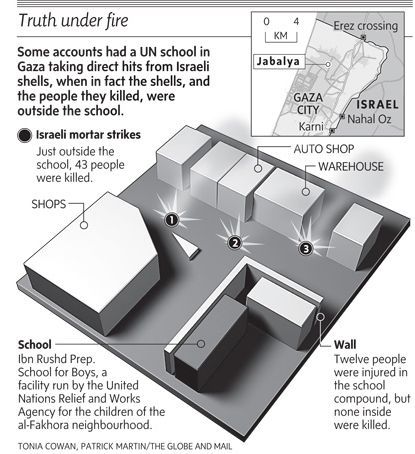 However, investigations revealed that not only had the Israeli shells fallen outside the school, but according to the IDF only 12 people — including 9 terrorists — were killed. HonestReporting had predicted that there would be tales of a massacre that would later be proven false 48 hours BEFORE the incident. If HonestReporting could predict that Hamas would attempt such a propaganda coup, why couldn’t the BBC?
However, investigations revealed that not only had the Israeli shells fallen outside the school, but according to the IDF only 12 people — including 9 terrorists — were killed. HonestReporting had predicted that there would be tales of a massacre that would later be proven false 48 hours BEFORE the incident. If HonestReporting could predict that Hamas would attempt such a propaganda coup, why couldn’t the BBC?
Even when the truth emerged, the BBC’s “correction”, while acknowledging that the shelling occurred outside of the school compound, failed to correct the number of dead and continues to omit that the IDF was responding to Palestinian rocket fire in proximity to the school.
Accurate and Trustworthy Accounts?
The BBC is not ashamed of such unbalanced favoritism. In fact, Bowen has boasted about the accounts coming from the Palestinian side. In his Middle East Diary entry for January 15, he reported that:
The fact that there are good Palestinian journalists in Gaza means that accurate and trustworthy accounts of what is happening are getting out.
On what is he basing his opinion that the accounts are accurate and trustworthy? With so many Palestinian claims being investigated and later dismissed, it seems he is vouching for something over which he has no knowledge. As the BBC’s top Middle East reporter, he has a professional responsibility to be objective and not simply accept narratives without corroborating evidence.
Images
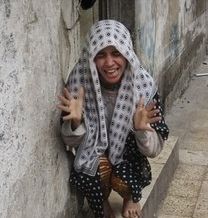 While shocking accounts of alleged atrocities helped spread anti-Israel sentiment around the world, it was images of casualties and destruction that really galvanized people. For this reason, it is vital that the BBC presents a balanced range of images accompanied with appropriate context. Yet, as illustrated in the chart below, the BBC image selection was overwhelmingly weighted in favor of those eliciting sympathy for the Palestinians.
While shocking accounts of alleged atrocities helped spread anti-Israel sentiment around the world, it was images of casualties and destruction that really galvanized people. For this reason, it is vital that the BBC presents a balanced range of images accompanied with appropriate context. Yet, as illustrated in the chart below, the BBC image selection was overwhelmingly weighted in favor of those eliciting sympathy for the Palestinians.
We analyzed 313 images that accompanied articles about the conflict. We broke these 313 into four main groups: Israeli soldiers, Palestinian terrorists, Israeli casualties or destruction, and Palestinian casualties or scenes of destruction. The images that the BBC selected overemphasize Palestinian suffering while underemphasizing Palestinian attacks.

Images require accompanying text to clarify and contextualize what the viewer is seeing. The BBC’s “in pictures” segments that highlighted certain images from that day, presented a significant problem. These images could often be found later accompanying BBC articles. These “in pictures” segments consisted solely of images and captions. We found that the captions frequently omitted critical information that would have an impact on the viewer.
Example I – Israel Destroys Government Ministries
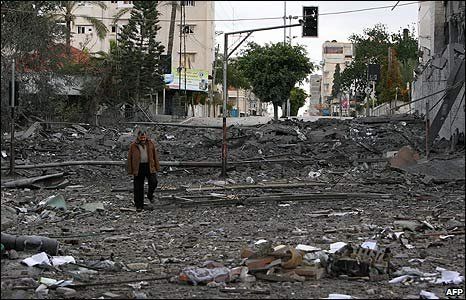 For example, the caption accompanying the image on the right read:
For example, the caption accompanying the image on the right read:
Several Hamas buildings have been destroyed, including the Justice Ministry, Legislative Assembly and Education ministry.
Anyone reading that caption with knowledge of Hamas tactics would assume that Israel was maliciously bombing Palestinian government agencies. In Gaza, however, the line between municipal government agencies and branches of the terrorist group Hamas are vague. All three of the ministries named above were run directly by Hamas and functioned as Hamas military centers during the conflict.
Example II – Israel Destroys Houses of Worship
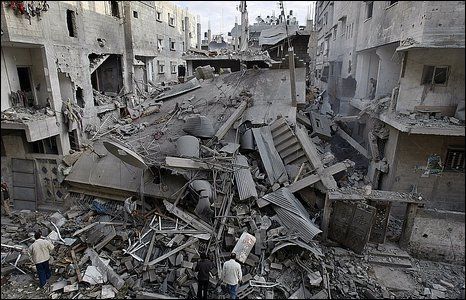 The caption accompanying this next image read:
The caption accompanying this next image read:
As air strikes on Gaza continued, more buildings were damaged and at least 10 people were killed when a mosque was hit, local medics said.
The fact that mosques were frequently used by Hamas to store and launch rockets is relevant to the story. Yet the viewer is never give this critical piece of information. Since this picture and caption are a part of an “in pictures’ segment, the viewer is given no additional information from which to draw a conclusion.
Highlighted Quotations
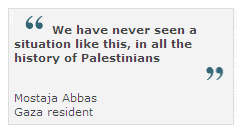 One way that the BBC draws attention to certain points of its articles is by selecting a quotation from the story and highlighting it in a text box to the right of the main article. Any reader skimming the article will focus on the quotations. Unfortunately, out of 38 highlighted quotations in the articles in our study, only 4 defended the Israeli position. Here is a sample of the quotations:
One way that the BBC draws attention to certain points of its articles is by selecting a quotation from the story and highlighting it in a text box to the right of the main article. Any reader skimming the article will focus on the quotations. Unfortunately, out of 38 highlighted quotations in the articles in our study, only 4 defended the Israeli position. Here is a sample of the quotations:
From the Palestinian Side:
-
“We have never seen a situation like this, in all the history of Palestinians.”
-
“We’re trying to hide in different corners of the apartment.”
-
align=justify>”We are unable to function normally, we have no cars, we can’t even wear police uniforms because of Israeli drones.”
-
“I have been trying to stop my children crying – I try to keep them playing.”
-
“The glass of my windows all fell down, so we spent the night scared and cold, my children were screaming. The attacks were continuous.”
-
“I left because I thought that the shooting was getting closer to my home and my children were scared.
-
“We had to squash [the injured into the ambulance]… on top of each other, including the dead man, just to get them to some sort of place of safety.”
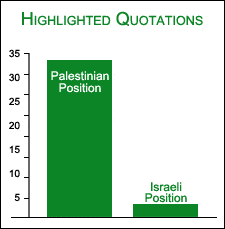 Quotations reflecting Israeli opinions were limited to the following:
Quotations reflecting Israeli opinions were limited to the following:
-
“Since the majority of the Hamas militants are pretty much in hiding in those places, mainly urban places, then we operate in those areas.” (repeated twice)
-
“Our definition is that anyone who is involved with terrorism within Hamas is a valid target. This ranges from the strictly military institutions and includes the political institutions that provide the logistical funding and human resources for the terrorist arm.”
-
“For the children’s sake we felt we had to go out. We love Sderot. But we had to go out for some time.”
As you can see, the majority of the Palestinian quotations were personal observations on the fighting. Only the last Israeli quotation was similar. Could the BBC not find anyone else living in Sderot who could speak about living in terror? There is no doubt that when the highlighted quotations focus on only one side, the reader will come away with a certain perspective.
Conclusions
The BBC’s coverage of the Gaza conflict painted a picture of an Israeli attack that intentionally targeted civilians and may have included war crimes. Specifically:
-
The BBC relied upon Palestinians who were given the opportunity to make dubious accusations without any supporting evidence.
-
The BBC published image after image of Palestinians suffering under Israeli attacks while giving readers few views of the impact that the conflict was having on Israeli civilians living under a constant and daily rocket barrage.
-
The most damning Palestinian statements about the Israeli operations were highlighted on the side of the articles, while Israeli statements were almost never treated in the same way.
We have said before that as one of the world’s top news sources, the BBC has a tremendous responsibility to report accurately and fairly. While the BBC claims to be impartial, it has done everything possible to deflect scrutiny of its work from being made public. Right now, a pending lawsuit in the House of Lords seeks to compel the BBC to make public an internal review that allegedly found that its Middle East reporting was biased against Israel.
Please contact the BBC and demand more balanced reporting. To help navigate the BBC’s complaints page, please click here. Afterwards, you may contact the BBC here.
To read our earlier reports on the BBC, click here (first half of 2007) or here (2007-2008). We plan to continue publishing long term analyses of specific media to determine whether reporting is fair and consistent. If you are interested in sponsoring one of these reports, please click here.

